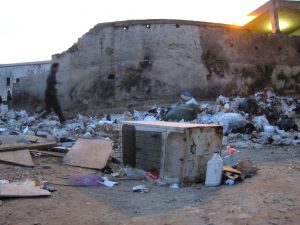 Recycling uses up the planet’s resources. You can do better than to recycle: consume less to begin with.
Recycling uses up the planet’s resources. You can do better than to recycle: consume less to begin with.
That’s the premise of this short book by British self-sufficiency expert Paul Peacock, who has written 14 books on topics ranging from seasonal cooking to keeping poultry for town dwellers.
Peacock dips into the question of what “quality of life” and “currency” really mean: money to afford supermarket jam, or the satisfaction derived from cooking up jam from fresh fruit?
A dilemma for the modern Western reader, who has little time to enjoy family, hobbies or just relaxing, but who’s compelled to get up each morning knowing that the best of her time and energy will be spent at the office.
According to Peacock:
“The fundamental basis of recycling is to use the resources we throw away in order to make products we buy. This means a continued demand for manufactured products, a need to use the recycled waste products to justify their recycling and an economy that can respond to these needs by buying them. In order to maintain such an economy, considerable resources and energy are needed. The buzzword is sustainable development.
But even if 100% of our resources are recycled, without a change in lifestyle we will continue to squander away our resources. There is no such thing as sustainable development. You cannot continue to consume more and at the same time make it somehow last forever. The only real development that lasts is reduction, consuming less, not more, and reducing our impact, not maintaining it.”
 Paul at one of his compost bins.
Paul at one of his compost bins.
Most of the chapters are dedicated to teaching how to cook and bake from scratch, with recipes for all kinds of staple foods. There is a chapter on creating household cleansers with a few basic materials like vinegar and baking soda. Peacock passes through homebrewing and soap making to home-made beauty products, and winds up with advice on vitamins and supplements.
As a self-sufficiency enthusiast, experienced in home cooking, winemaking, and the manufacture of artisanal soap, I found this book often superficial, even unrealistic. The author recommends buying an entire sheepskin in order to extract the lanolin out of it, for example.
His recommendation to make soapmaking lye by burning “plant matter” reminds me of The Closet of Sir Kenelm Digby Opened (links to free e-book), a treatise on domestic matters written in 1669. Peacock advises us to render beef tallow and lard to obtain soapmaking fats. Today’s soap makers use granulated lye and vegetable oils, rarely rending beef tallow and lard – because it’s labor-intensive, but also because soap made with animal fats retains a lingering meaty odor, no matter how you disguise it. This is something Peacock doesn’t mention. His ideas of self-sufficiency sometimes seem more romantic than practical.
An Old Fashioned Charm
Mr. Peacock’s winemaking methods are less charmingly old-fashioned than primitive. No mention of the hydrometer, a simple manual device that allows the home brewer to monitor fermentation and choose the alcohol by volume in the finished product (rather than just accepting whatever Nature determines). And the recommendation to use brewer’s yeast to make country wine, when good wine yeasts are accessible and cheap, made this home brewer shrug.
The tone of the book is conversational and friendly, although the repeated use of “brilliant” to denote approval becomes annoying after a while. Although the resources pages list suppliers both in the UK and the USA, it was clearly written for the British public, and assumes that the reader has a garden with a shed.
If the lights ever do go out (see review on The Road), this book would be a useful guide to creating home products from scratch. As it is, I’d recommend it to people to whom self-sufficiency is still a new concept. I did enjoy the kicker, though – how to recycle the book when it’s all old and worn out by seeding it with mushroom spores.
Precycle! is published by The Good Life Press Ltd, www.goodlifepress.co.uk.
More Green Prophet book reviews:
- Wild Fermentation, by Sandor Katz
- Red Alert! by Daniel Wildcat
- The Vanishing Face of Gaia, by James Lovelock




Precycling is about recycling BEFORE you buy and is packed full with recipes for everything you could possibly need in the kitchen, the bathroom, the utility room and even the bedroom. This handy reference book gives tips and recipes on how to make everything you buy in the shops, from sauces to sausges, bleach to beer and detergents to disinfectants fo that, instead of buying products which are often heavy on chemicals and then throwing away or recyling the packaging you can miss out that entire stage and make the contents yourself, saving a fortune, getting better, chemical-free products and saving the planet in the process.
Precycling is about recycling BEFORE you buy and is packed full with recipes for everything you could possibly need in the kitchen, the bathroom, the utility room and even the bedroom. This handy reference book gives tips and recipes on how to make everything you buy in the shops, from sauces to sausges, bleach to beer and detergents to disinfectants fo that, instead of buying products which are often heavy on chemicals and then throwing away or recyling the packaging you can miss out that entire stage and make the contents yourself, saving a fortune, getting better, chemical-free products and saving the planet in the process.